International Business and Globalisation: Opportunities and Challenges
VerifiedAdded on 2020/09/08
|8
|3249
|30
Report
AI Summary
This report examines the profound impact of globalization on international business, highlighting both its advantages and disadvantages for companies, countries, and social groups. It explores how globalization facilitates market expansion, technological advancements, and foreign direct investment, leading to increased competition and economic growth. The report analyzes the effects on developed, developing, and undeveloped countries, emphasizing the importance of competitive advantage, consumer needs, and the role of social groups. It discusses the challenges such as income inequality and employment issues, while also detailing the opportunities for free trade, technological innovation, and improved standards of living. The report uses examples of companies like Aldi, Tesco, and McDonald's to illustrate the benefits of globalization and the strategies employed to succeed in the global market. Overall, the report provides a comprehensive overview of the complex dynamics of international business in a globalized world, emphasizing the need for strategic adaptation and understanding of the global landscape.
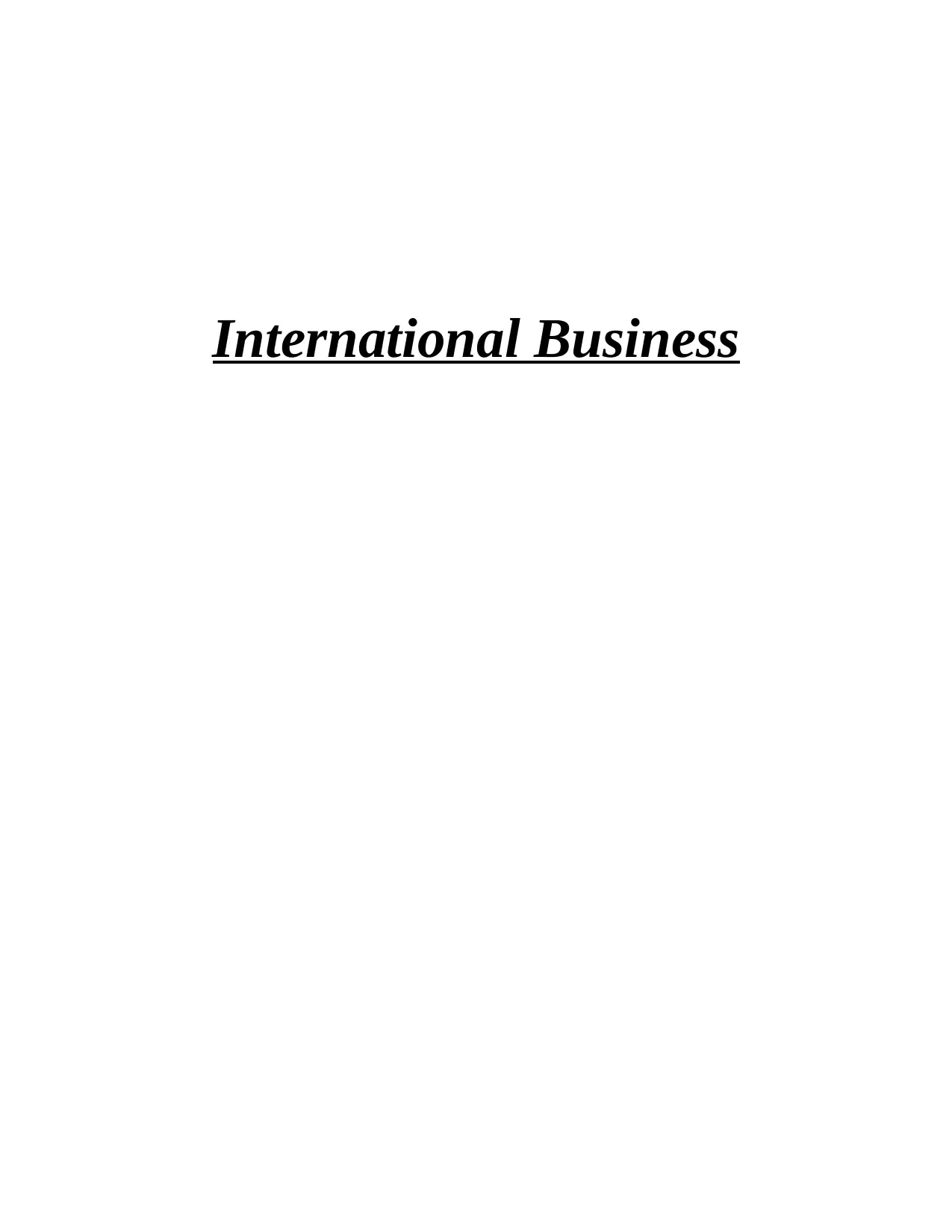
International Business
Paraphrase This Document
Need a fresh take? Get an instant paraphrase of this document with our AI Paraphraser
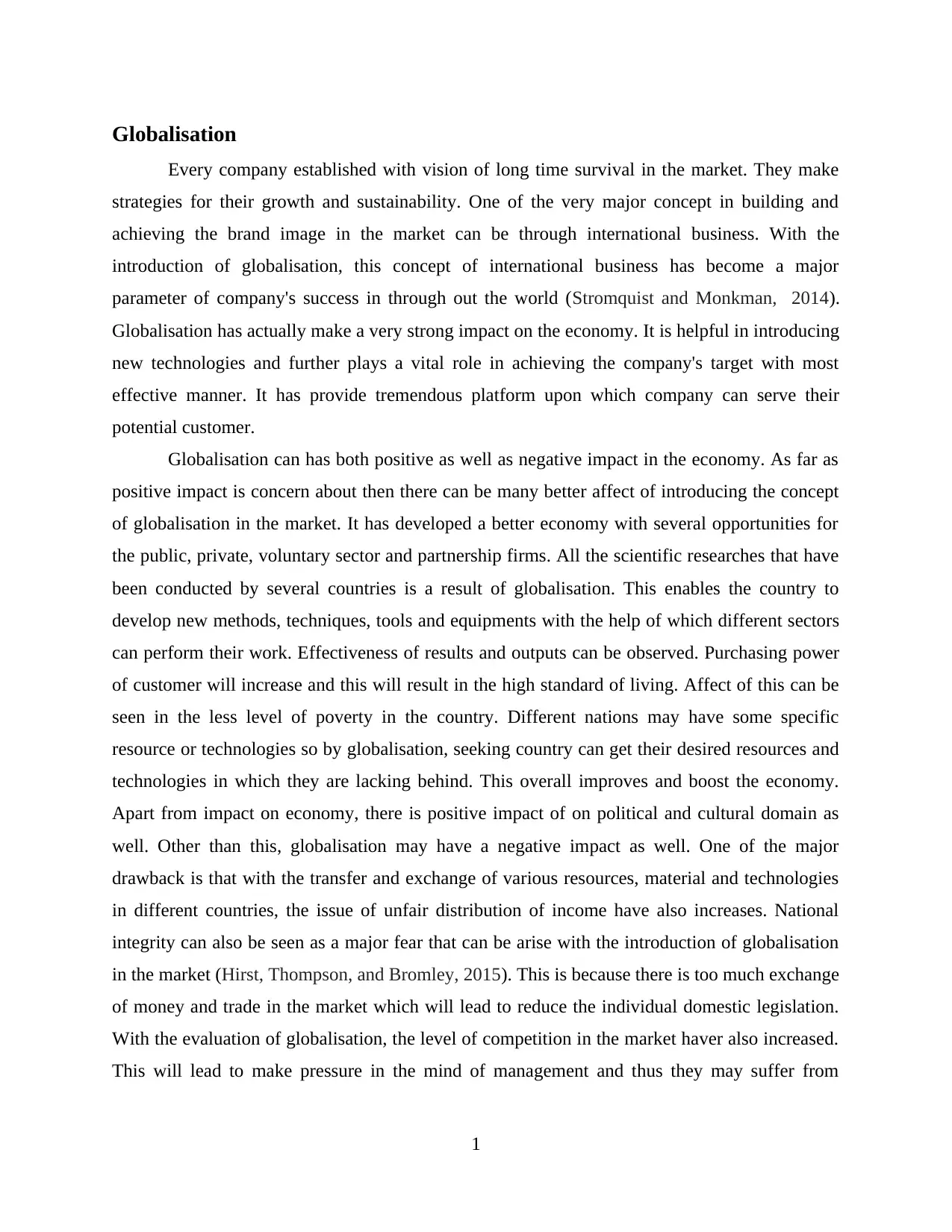
Globalisation
Every company established with vision of long time survival in the market. They make
strategies for their growth and sustainability. One of the very major concept in building and
achieving the brand image in the market can be through international business. With the
introduction of globalisation, this concept of international business has become a major
parameter of company's success in through out the world (Stromquist and Monkman, 2014).
Globalisation has actually make a very strong impact on the economy. It is helpful in introducing
new technologies and further plays a vital role in achieving the company's target with most
effective manner. It has provide tremendous platform upon which company can serve their
potential customer.
Globalisation can has both positive as well as negative impact in the economy. As far as
positive impact is concern about then there can be many better affect of introducing the concept
of globalisation in the market. It has developed a better economy with several opportunities for
the public, private, voluntary sector and partnership firms. All the scientific researches that have
been conducted by several countries is a result of globalisation. This enables the country to
develop new methods, techniques, tools and equipments with the help of which different sectors
can perform their work. Effectiveness of results and outputs can be observed. Purchasing power
of customer will increase and this will result in the high standard of living. Affect of this can be
seen in the less level of poverty in the country. Different nations may have some specific
resource or technologies so by globalisation, seeking country can get their desired resources and
technologies in which they are lacking behind. This overall improves and boost the economy.
Apart from impact on economy, there is positive impact of on political and cultural domain as
well. Other than this, globalisation may have a negative impact as well. One of the major
drawback is that with the transfer and exchange of various resources, material and technologies
in different countries, the issue of unfair distribution of income have also increases. National
integrity can also be seen as a major fear that can be arise with the introduction of globalisation
in the market (Hirst, Thompson, and Bromley, 2015). This is because there is too much exchange
of money and trade in the market which will lead to reduce the individual domestic legislation.
With the evaluation of globalisation, the level of competition in the market haver also increased.
This will lead to make pressure in the mind of management and thus they may suffer from
1
Every company established with vision of long time survival in the market. They make
strategies for their growth and sustainability. One of the very major concept in building and
achieving the brand image in the market can be through international business. With the
introduction of globalisation, this concept of international business has become a major
parameter of company's success in through out the world (Stromquist and Monkman, 2014).
Globalisation has actually make a very strong impact on the economy. It is helpful in introducing
new technologies and further plays a vital role in achieving the company's target with most
effective manner. It has provide tremendous platform upon which company can serve their
potential customer.
Globalisation can has both positive as well as negative impact in the economy. As far as
positive impact is concern about then there can be many better affect of introducing the concept
of globalisation in the market. It has developed a better economy with several opportunities for
the public, private, voluntary sector and partnership firms. All the scientific researches that have
been conducted by several countries is a result of globalisation. This enables the country to
develop new methods, techniques, tools and equipments with the help of which different sectors
can perform their work. Effectiveness of results and outputs can be observed. Purchasing power
of customer will increase and this will result in the high standard of living. Affect of this can be
seen in the less level of poverty in the country. Different nations may have some specific
resource or technologies so by globalisation, seeking country can get their desired resources and
technologies in which they are lacking behind. This overall improves and boost the economy.
Apart from impact on economy, there is positive impact of on political and cultural domain as
well. Other than this, globalisation may have a negative impact as well. One of the major
drawback is that with the transfer and exchange of various resources, material and technologies
in different countries, the issue of unfair distribution of income have also increases. National
integrity can also be seen as a major fear that can be arise with the introduction of globalisation
in the market (Hirst, Thompson, and Bromley, 2015). This is because there is too much exchange
of money and trade in the market which will lead to reduce the individual domestic legislation.
With the evaluation of globalisation, the level of competition in the market haver also increased.
This will lead to make pressure in the mind of management and thus they may suffer from
1
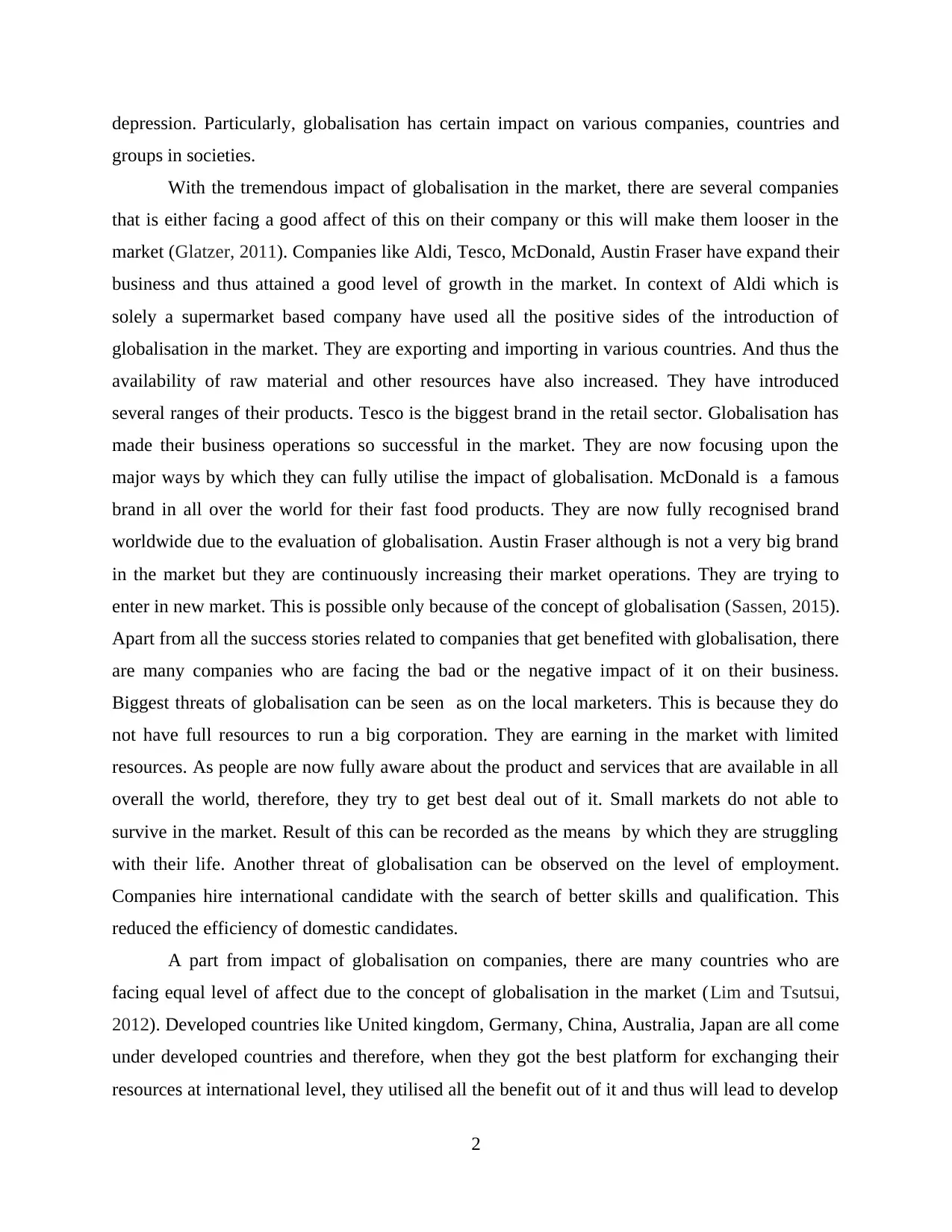
depression. Particularly, globalisation has certain impact on various companies, countries and
groups in societies.
With the tremendous impact of globalisation in the market, there are several companies
that is either facing a good affect of this on their company or this will make them looser in the
market (Glatzer, 2011). Companies like Aldi, Tesco, McDonald, Austin Fraser have expand their
business and thus attained a good level of growth in the market. In context of Aldi which is
solely a supermarket based company have used all the positive sides of the introduction of
globalisation in the market. They are exporting and importing in various countries. And thus the
availability of raw material and other resources have also increased. They have introduced
several ranges of their products. Tesco is the biggest brand in the retail sector. Globalisation has
made their business operations so successful in the market. They are now focusing upon the
major ways by which they can fully utilise the impact of globalisation. McDonald is a famous
brand in all over the world for their fast food products. They are now fully recognised brand
worldwide due to the evaluation of globalisation. Austin Fraser although is not a very big brand
in the market but they are continuously increasing their market operations. They are trying to
enter in new market. This is possible only because of the concept of globalisation (Sassen, 2015).
Apart from all the success stories related to companies that get benefited with globalisation, there
are many companies who are facing the bad or the negative impact of it on their business.
Biggest threats of globalisation can be seen as on the local marketers. This is because they do
not have full resources to run a big corporation. They are earning in the market with limited
resources. As people are now fully aware about the product and services that are available in all
overall the world, therefore, they try to get best deal out of it. Small markets do not able to
survive in the market. Result of this can be recorded as the means by which they are struggling
with their life. Another threat of globalisation can be observed on the level of employment.
Companies hire international candidate with the search of better skills and qualification. This
reduced the efficiency of domestic candidates.
A part from impact of globalisation on companies, there are many countries who are
facing equal level of affect due to the concept of globalisation in the market (Lim and Tsutsui,
2012). Developed countries like United kingdom, Germany, China, Australia, Japan are all come
under developed countries and therefore, when they got the best platform for exchanging their
resources at international level, they utilised all the benefit out of it and thus will lead to develop
2
groups in societies.
With the tremendous impact of globalisation in the market, there are several companies
that is either facing a good affect of this on their company or this will make them looser in the
market (Glatzer, 2011). Companies like Aldi, Tesco, McDonald, Austin Fraser have expand their
business and thus attained a good level of growth in the market. In context of Aldi which is
solely a supermarket based company have used all the positive sides of the introduction of
globalisation in the market. They are exporting and importing in various countries. And thus the
availability of raw material and other resources have also increased. They have introduced
several ranges of their products. Tesco is the biggest brand in the retail sector. Globalisation has
made their business operations so successful in the market. They are now focusing upon the
major ways by which they can fully utilise the impact of globalisation. McDonald is a famous
brand in all over the world for their fast food products. They are now fully recognised brand
worldwide due to the evaluation of globalisation. Austin Fraser although is not a very big brand
in the market but they are continuously increasing their market operations. They are trying to
enter in new market. This is possible only because of the concept of globalisation (Sassen, 2015).
Apart from all the success stories related to companies that get benefited with globalisation, there
are many companies who are facing the bad or the negative impact of it on their business.
Biggest threats of globalisation can be seen as on the local marketers. This is because they do
not have full resources to run a big corporation. They are earning in the market with limited
resources. As people are now fully aware about the product and services that are available in all
overall the world, therefore, they try to get best deal out of it. Small markets do not able to
survive in the market. Result of this can be recorded as the means by which they are struggling
with their life. Another threat of globalisation can be observed on the level of employment.
Companies hire international candidate with the search of better skills and qualification. This
reduced the efficiency of domestic candidates.
A part from impact of globalisation on companies, there are many countries who are
facing equal level of affect due to the concept of globalisation in the market (Lim and Tsutsui,
2012). Developed countries like United kingdom, Germany, China, Australia, Japan are all come
under developed countries and therefore, when they got the best platform for exchanging their
resources at international level, they utilised all the benefit out of it and thus will lead to develop
2
⊘ This is a preview!⊘
Do you want full access?
Subscribe today to unlock all pages.

Trusted by 1+ million students worldwide
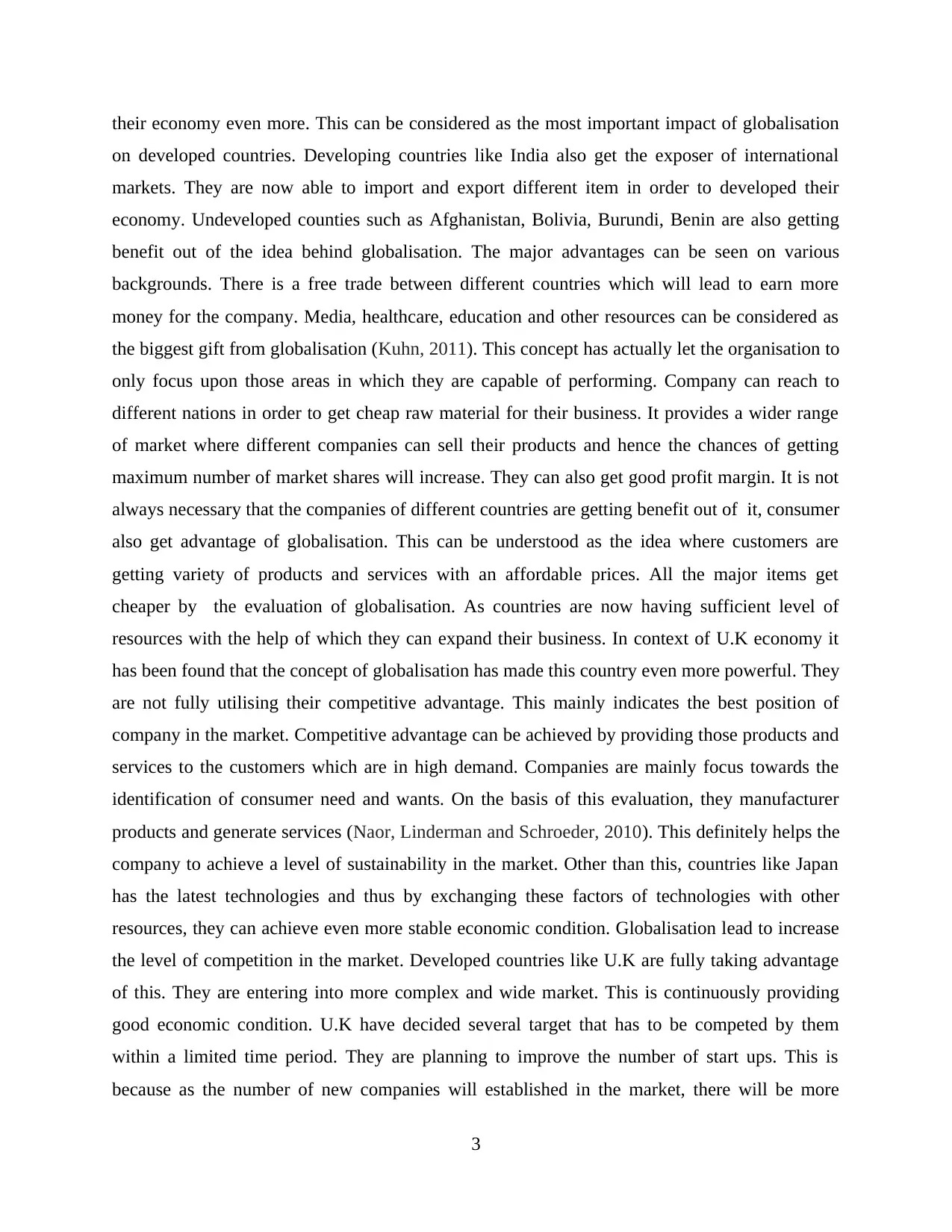
their economy even more. This can be considered as the most important impact of globalisation
on developed countries. Developing countries like India also get the exposer of international
markets. They are now able to import and export different item in order to developed their
economy. Undeveloped counties such as Afghanistan, Bolivia, Burundi, Benin are also getting
benefit out of the idea behind globalisation. The major advantages can be seen on various
backgrounds. There is a free trade between different countries which will lead to earn more
money for the company. Media, healthcare, education and other resources can be considered as
the biggest gift from globalisation (Kuhn, 2011). This concept has actually let the organisation to
only focus upon those areas in which they are capable of performing. Company can reach to
different nations in order to get cheap raw material for their business. It provides a wider range
of market where different companies can sell their products and hence the chances of getting
maximum number of market shares will increase. They can also get good profit margin. It is not
always necessary that the companies of different countries are getting benefit out of it, consumer
also get advantage of globalisation. This can be understood as the idea where customers are
getting variety of products and services with an affordable prices. All the major items get
cheaper by the evaluation of globalisation. As countries are now having sufficient level of
resources with the help of which they can expand their business. In context of U.K economy it
has been found that the concept of globalisation has made this country even more powerful. They
are not fully utilising their competitive advantage. This mainly indicates the best position of
company in the market. Competitive advantage can be achieved by providing those products and
services to the customers which are in high demand. Companies are mainly focus towards the
identification of consumer need and wants. On the basis of this evaluation, they manufacturer
products and generate services (Naor, Linderman and Schroeder, 2010). This definitely helps the
company to achieve a level of sustainability in the market. Other than this, countries like Japan
has the latest technologies and thus by exchanging these factors of technologies with other
resources, they can achieve even more stable economic condition. Globalisation lead to increase
the level of competition in the market. Developed countries like U.K are fully taking advantage
of this. They are entering into more complex and wide market. This is continuously providing
good economic condition. U.K have decided several target that has to be competed by them
within a limited time period. They are planning to improve the number of start ups. This is
because as the number of new companies will established in the market, there will be more
3
on developed countries. Developing countries like India also get the exposer of international
markets. They are now able to import and export different item in order to developed their
economy. Undeveloped counties such as Afghanistan, Bolivia, Burundi, Benin are also getting
benefit out of the idea behind globalisation. The major advantages can be seen on various
backgrounds. There is a free trade between different countries which will lead to earn more
money for the company. Media, healthcare, education and other resources can be considered as
the biggest gift from globalisation (Kuhn, 2011). This concept has actually let the organisation to
only focus upon those areas in which they are capable of performing. Company can reach to
different nations in order to get cheap raw material for their business. It provides a wider range
of market where different companies can sell their products and hence the chances of getting
maximum number of market shares will increase. They can also get good profit margin. It is not
always necessary that the companies of different countries are getting benefit out of it, consumer
also get advantage of globalisation. This can be understood as the idea where customers are
getting variety of products and services with an affordable prices. All the major items get
cheaper by the evaluation of globalisation. As countries are now having sufficient level of
resources with the help of which they can expand their business. In context of U.K economy it
has been found that the concept of globalisation has made this country even more powerful. They
are not fully utilising their competitive advantage. This mainly indicates the best position of
company in the market. Competitive advantage can be achieved by providing those products and
services to the customers which are in high demand. Companies are mainly focus towards the
identification of consumer need and wants. On the basis of this evaluation, they manufacturer
products and generate services (Naor, Linderman and Schroeder, 2010). This definitely helps the
company to achieve a level of sustainability in the market. Other than this, countries like Japan
has the latest technologies and thus by exchanging these factors of technologies with other
resources, they can achieve even more stable economic condition. Globalisation lead to increase
the level of competition in the market. Developed countries like U.K are fully taking advantage
of this. They are entering into more complex and wide market. This is continuously providing
good economic condition. U.K have decided several target that has to be competed by them
within a limited time period. They are planning to improve the number of start ups. This is
because as the number of new companies will established in the market, there will be more
3
Paraphrase This Document
Need a fresh take? Get an instant paraphrase of this document with our AI Paraphraser
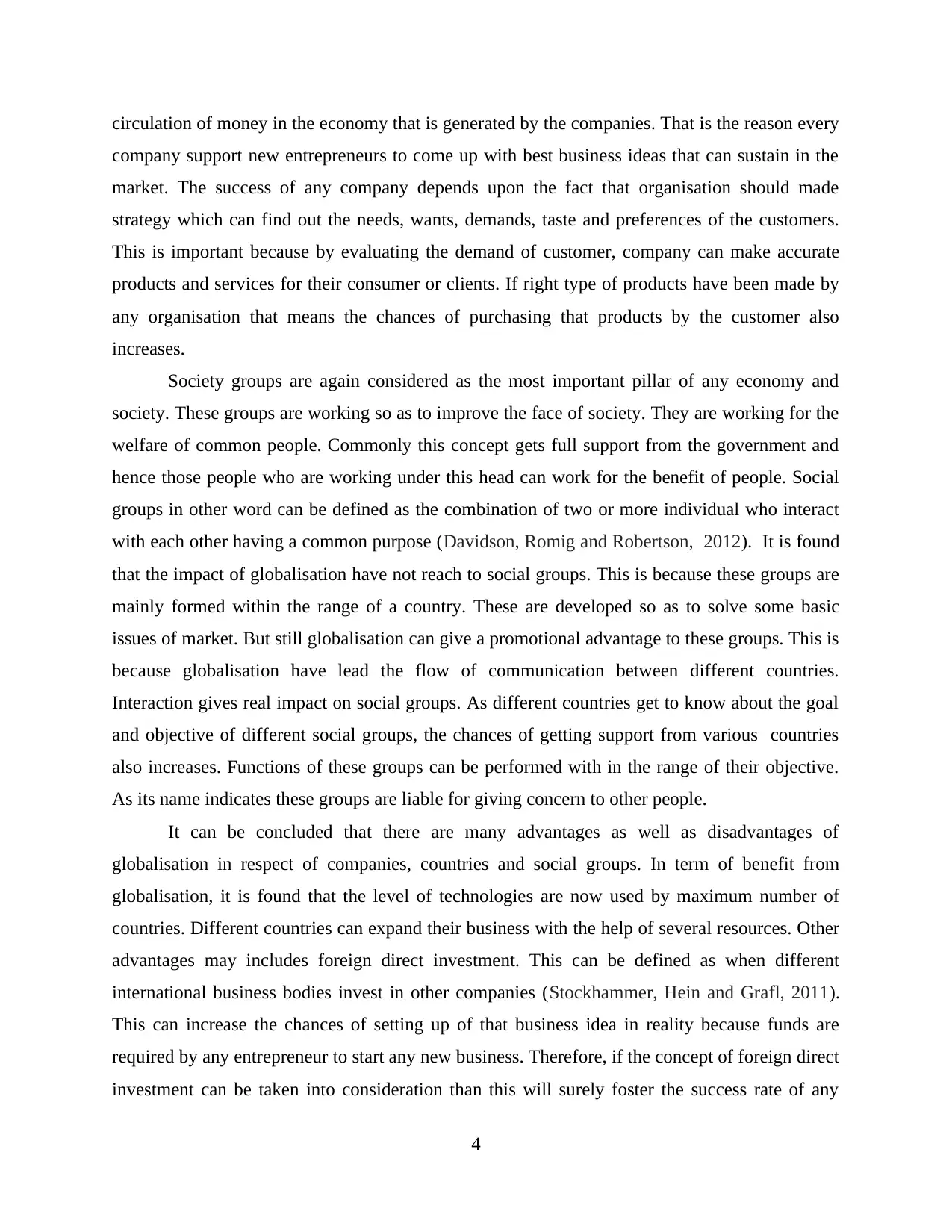
circulation of money in the economy that is generated by the companies. That is the reason every
company support new entrepreneurs to come up with best business ideas that can sustain in the
market. The success of any company depends upon the fact that organisation should made
strategy which can find out the needs, wants, demands, taste and preferences of the customers.
This is important because by evaluating the demand of customer, company can make accurate
products and services for their consumer or clients. If right type of products have been made by
any organisation that means the chances of purchasing that products by the customer also
increases.
Society groups are again considered as the most important pillar of any economy and
society. These groups are working so as to improve the face of society. They are working for the
welfare of common people. Commonly this concept gets full support from the government and
hence those people who are working under this head can work for the benefit of people. Social
groups in other word can be defined as the combination of two or more individual who interact
with each other having a common purpose (Davidson, Romig and Robertson, 2012). It is found
that the impact of globalisation have not reach to social groups. This is because these groups are
mainly formed within the range of a country. These are developed so as to solve some basic
issues of market. But still globalisation can give a promotional advantage to these groups. This is
because globalisation have lead the flow of communication between different countries.
Interaction gives real impact on social groups. As different countries get to know about the goal
and objective of different social groups, the chances of getting support from various countries
also increases. Functions of these groups can be performed with in the range of their objective.
As its name indicates these groups are liable for giving concern to other people.
It can be concluded that there are many advantages as well as disadvantages of
globalisation in respect of companies, countries and social groups. In term of benefit from
globalisation, it is found that the level of technologies are now used by maximum number of
countries. Different countries can expand their business with the help of several resources. Other
advantages may includes foreign direct investment. This can be defined as when different
international business bodies invest in other companies (Stockhammer, Hein and Grafl, 2011).
This can increase the chances of setting up of that business idea in reality because funds are
required by any entrepreneur to start any new business. Therefore, if the concept of foreign direct
investment can be taken into consideration than this will surely foster the success rate of any
4
company support new entrepreneurs to come up with best business ideas that can sustain in the
market. The success of any company depends upon the fact that organisation should made
strategy which can find out the needs, wants, demands, taste and preferences of the customers.
This is important because by evaluating the demand of customer, company can make accurate
products and services for their consumer or clients. If right type of products have been made by
any organisation that means the chances of purchasing that products by the customer also
increases.
Society groups are again considered as the most important pillar of any economy and
society. These groups are working so as to improve the face of society. They are working for the
welfare of common people. Commonly this concept gets full support from the government and
hence those people who are working under this head can work for the benefit of people. Social
groups in other word can be defined as the combination of two or more individual who interact
with each other having a common purpose (Davidson, Romig and Robertson, 2012). It is found
that the impact of globalisation have not reach to social groups. This is because these groups are
mainly formed within the range of a country. These are developed so as to solve some basic
issues of market. But still globalisation can give a promotional advantage to these groups. This is
because globalisation have lead the flow of communication between different countries.
Interaction gives real impact on social groups. As different countries get to know about the goal
and objective of different social groups, the chances of getting support from various countries
also increases. Functions of these groups can be performed with in the range of their objective.
As its name indicates these groups are liable for giving concern to other people.
It can be concluded that there are many advantages as well as disadvantages of
globalisation in respect of companies, countries and social groups. In term of benefit from
globalisation, it is found that the level of technologies are now used by maximum number of
countries. Different countries can expand their business with the help of several resources. Other
advantages may includes foreign direct investment. This can be defined as when different
international business bodies invest in other companies (Stockhammer, Hein and Grafl, 2011).
This can increase the chances of setting up of that business idea in reality because funds are
required by any entrepreneur to start any new business. Therefore, if the concept of foreign direct
investment can be taken into consideration than this will surely foster the success rate of any
4
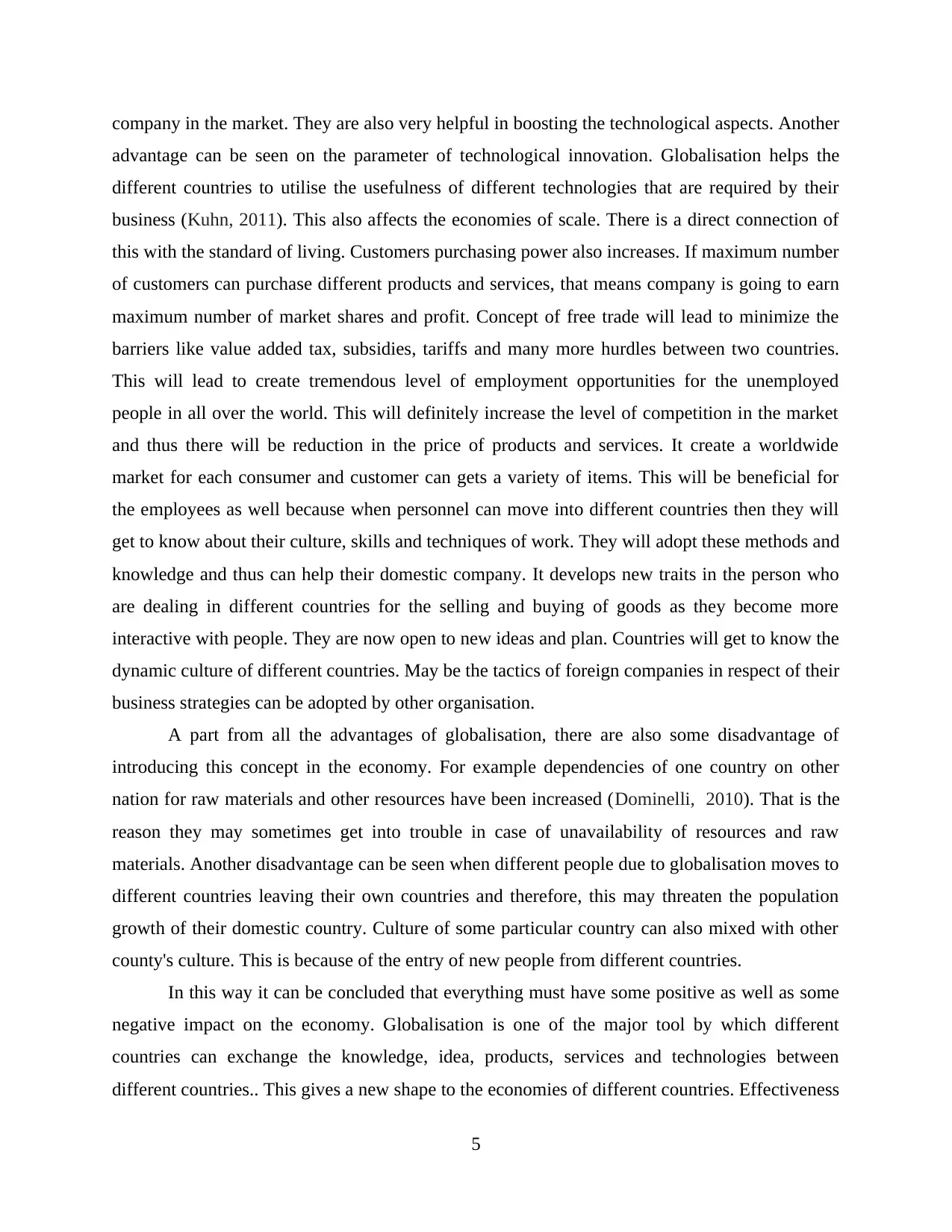
company in the market. They are also very helpful in boosting the technological aspects. Another
advantage can be seen on the parameter of technological innovation. Globalisation helps the
different countries to utilise the usefulness of different technologies that are required by their
business (Kuhn, 2011). This also affects the economies of scale. There is a direct connection of
this with the standard of living. Customers purchasing power also increases. If maximum number
of customers can purchase different products and services, that means company is going to earn
maximum number of market shares and profit. Concept of free trade will lead to minimize the
barriers like value added tax, subsidies, tariffs and many more hurdles between two countries.
This will lead to create tremendous level of employment opportunities for the unemployed
people in all over the world. This will definitely increase the level of competition in the market
and thus there will be reduction in the price of products and services. It create a worldwide
market for each consumer and customer can gets a variety of items. This will be beneficial for
the employees as well because when personnel can move into different countries then they will
get to know about their culture, skills and techniques of work. They will adopt these methods and
knowledge and thus can help their domestic company. It develops new traits in the person who
are dealing in different countries for the selling and buying of goods as they become more
interactive with people. They are now open to new ideas and plan. Countries will get to know the
dynamic culture of different countries. May be the tactics of foreign companies in respect of their
business strategies can be adopted by other organisation.
A part from all the advantages of globalisation, there are also some disadvantage of
introducing this concept in the economy. For example dependencies of one country on other
nation for raw materials and other resources have been increased (Dominelli, 2010). That is the
reason they may sometimes get into trouble in case of unavailability of resources and raw
materials. Another disadvantage can be seen when different people due to globalisation moves to
different countries leaving their own countries and therefore, this may threaten the population
growth of their domestic country. Culture of some particular country can also mixed with other
county's culture. This is because of the entry of new people from different countries.
In this way it can be concluded that everything must have some positive as well as some
negative impact on the economy. Globalisation is one of the major tool by which different
countries can exchange the knowledge, idea, products, services and technologies between
different countries.. This gives a new shape to the economies of different countries. Effectiveness
5
advantage can be seen on the parameter of technological innovation. Globalisation helps the
different countries to utilise the usefulness of different technologies that are required by their
business (Kuhn, 2011). This also affects the economies of scale. There is a direct connection of
this with the standard of living. Customers purchasing power also increases. If maximum number
of customers can purchase different products and services, that means company is going to earn
maximum number of market shares and profit. Concept of free trade will lead to minimize the
barriers like value added tax, subsidies, tariffs and many more hurdles between two countries.
This will lead to create tremendous level of employment opportunities for the unemployed
people in all over the world. This will definitely increase the level of competition in the market
and thus there will be reduction in the price of products and services. It create a worldwide
market for each consumer and customer can gets a variety of items. This will be beneficial for
the employees as well because when personnel can move into different countries then they will
get to know about their culture, skills and techniques of work. They will adopt these methods and
knowledge and thus can help their domestic company. It develops new traits in the person who
are dealing in different countries for the selling and buying of goods as they become more
interactive with people. They are now open to new ideas and plan. Countries will get to know the
dynamic culture of different countries. May be the tactics of foreign companies in respect of their
business strategies can be adopted by other organisation.
A part from all the advantages of globalisation, there are also some disadvantage of
introducing this concept in the economy. For example dependencies of one country on other
nation for raw materials and other resources have been increased (Dominelli, 2010). That is the
reason they may sometimes get into trouble in case of unavailability of resources and raw
materials. Another disadvantage can be seen when different people due to globalisation moves to
different countries leaving their own countries and therefore, this may threaten the population
growth of their domestic country. Culture of some particular country can also mixed with other
county's culture. This is because of the entry of new people from different countries.
In this way it can be concluded that everything must have some positive as well as some
negative impact on the economy. Globalisation is one of the major tool by which different
countries can exchange the knowledge, idea, products, services and technologies between
different countries.. This gives a new shape to the economies of different countries. Effectiveness
5
⊘ This is a preview!⊘
Do you want full access?
Subscribe today to unlock all pages.

Trusted by 1+ million students worldwide
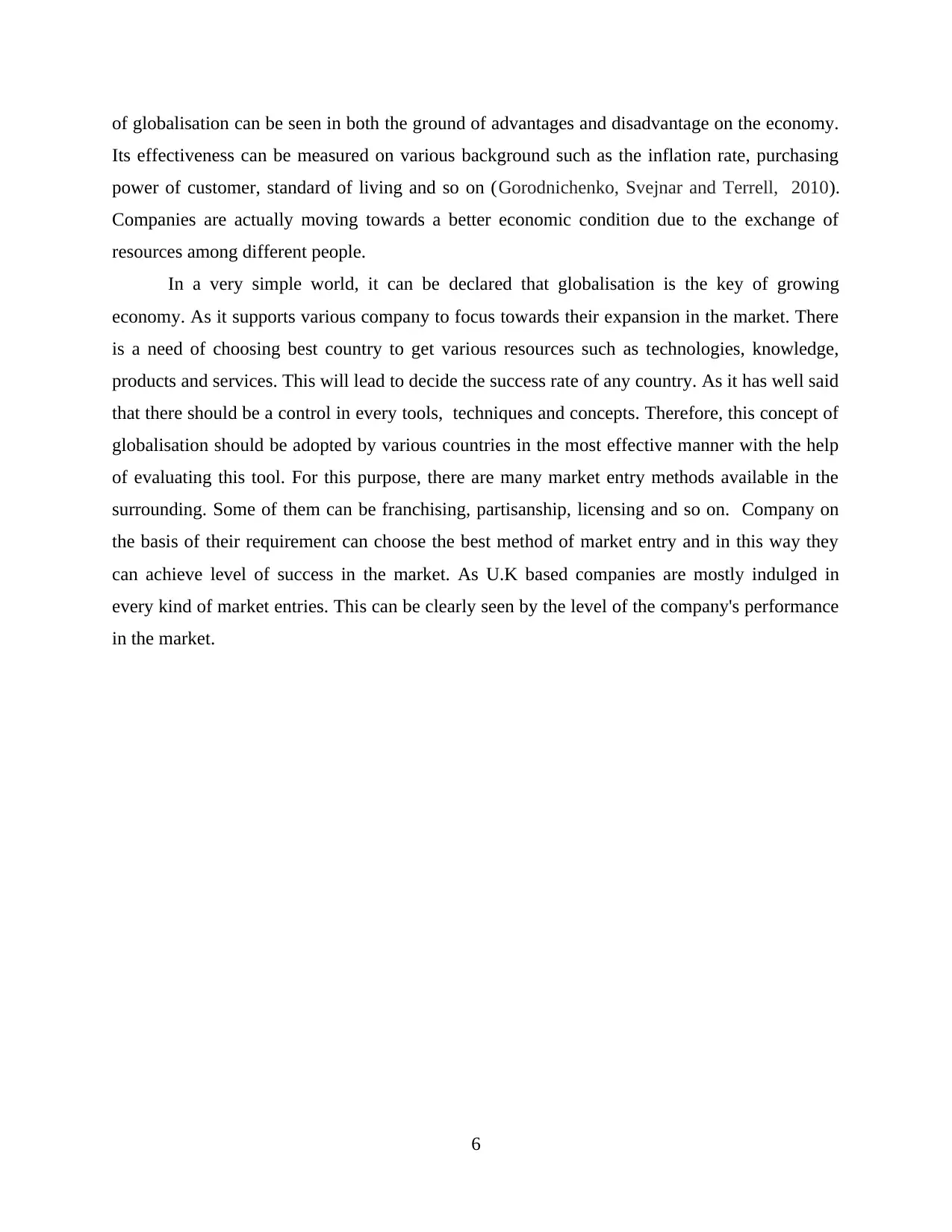
of globalisation can be seen in both the ground of advantages and disadvantage on the economy.
Its effectiveness can be measured on various background such as the inflation rate, purchasing
power of customer, standard of living and so on (Gorodnichenko, Svejnar and Terrell, 2010).
Companies are actually moving towards a better economic condition due to the exchange of
resources among different people.
In a very simple world, it can be declared that globalisation is the key of growing
economy. As it supports various company to focus towards their expansion in the market. There
is a need of choosing best country to get various resources such as technologies, knowledge,
products and services. This will lead to decide the success rate of any country. As it has well said
that there should be a control in every tools, techniques and concepts. Therefore, this concept of
globalisation should be adopted by various countries in the most effective manner with the help
of evaluating this tool. For this purpose, there are many market entry methods available in the
surrounding. Some of them can be franchising, partisanship, licensing and so on. Company on
the basis of their requirement can choose the best method of market entry and in this way they
can achieve level of success in the market. As U.K based companies are mostly indulged in
every kind of market entries. This can be clearly seen by the level of the company's performance
in the market.
6
Its effectiveness can be measured on various background such as the inflation rate, purchasing
power of customer, standard of living and so on (Gorodnichenko, Svejnar and Terrell, 2010).
Companies are actually moving towards a better economic condition due to the exchange of
resources among different people.
In a very simple world, it can be declared that globalisation is the key of growing
economy. As it supports various company to focus towards their expansion in the market. There
is a need of choosing best country to get various resources such as technologies, knowledge,
products and services. This will lead to decide the success rate of any country. As it has well said
that there should be a control in every tools, techniques and concepts. Therefore, this concept of
globalisation should be adopted by various countries in the most effective manner with the help
of evaluating this tool. For this purpose, there are many market entry methods available in the
surrounding. Some of them can be franchising, partisanship, licensing and so on. Company on
the basis of their requirement can choose the best method of market entry and in this way they
can achieve level of success in the market. As U.K based companies are mostly indulged in
every kind of market entries. This can be clearly seen by the level of the company's performance
in the market.
6
Paraphrase This Document
Need a fresh take? Get an instant paraphrase of this document with our AI Paraphraser
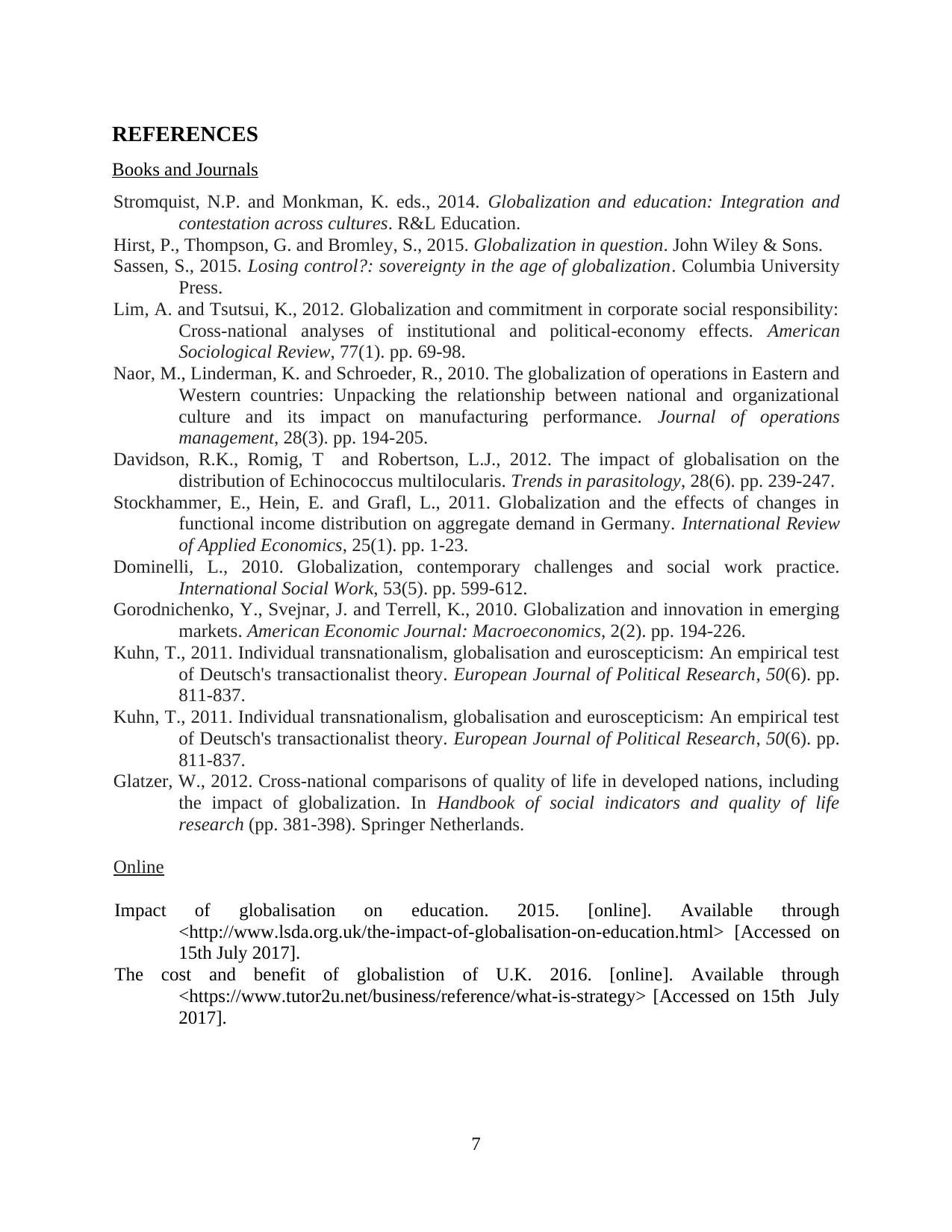
REFERENCES
Books and Journals
Stromquist, N.P. and Monkman, K. eds., 2014. Globalization and education: Integration and
contestation across cultures. R&L Education.
Hirst, P., Thompson, G. and Bromley, S., 2015. Globalization in question. John Wiley & Sons.
Sassen, S., 2015. Losing control?: sovereignty in the age of globalization. Columbia University
Press.
Lim, A. and Tsutsui, K., 2012. Globalization and commitment in corporate social responsibility:
Cross-national analyses of institutional and political-economy effects. American
Sociological Review, 77(1). pp. 69-98.
Naor, M., Linderman, K. and Schroeder, R., 2010. The globalization of operations in Eastern and
Western countries: Unpacking the relationship between national and organizational
culture and its impact on manufacturing performance. Journal of operations
management, 28(3). pp. 194-205.
Davidson, R.K., Romig, T and Robertson, L.J., 2012. The impact of globalisation on the
distribution of Echinococcus multilocularis. Trends in parasitology, 28(6). pp. 239-247.
Stockhammer, E., Hein, E. and Grafl, L., 2011. Globalization and the effects of changes in
functional income distribution on aggregate demand in Germany. International Review
of Applied Economics, 25(1). pp. 1-23.
Dominelli, L., 2010. Globalization, contemporary challenges and social work practice.
International Social Work, 53(5). pp. 599-612.
Gorodnichenko, Y., Svejnar, J. and Terrell, K., 2010. Globalization and innovation in emerging
markets. American Economic Journal: Macroeconomics, 2(2). pp. 194-226.
Kuhn, T., 2011. Individual transnationalism, globalisation and euroscepticism: An empirical test
of Deutsch's transactionalist theory. European Journal of Political Research, 50(6). pp.
811-837.
Kuhn, T., 2011. Individual transnationalism, globalisation and euroscepticism: An empirical test
of Deutsch's transactionalist theory. European Journal of Political Research, 50(6). pp.
811-837.
Glatzer, W., 2012. Cross-national comparisons of quality of life in developed nations, including
the impact of globalization. In Handbook of social indicators and quality of life
research (pp. 381-398). Springer Netherlands.
Online
Impact of globalisation on education. 2015. [online]. Available through
<http://www.lsda.org.uk/the-impact-of-globalisation-on-education.html> [Accessed on
15th July 2017].
The cost and benefit of globalistion of U.K. 2016. [online]. Available through
<https://www.tutor2u.net/business/reference/what-is-strategy> [Accessed on 15th July
2017].
7
Books and Journals
Stromquist, N.P. and Monkman, K. eds., 2014. Globalization and education: Integration and
contestation across cultures. R&L Education.
Hirst, P., Thompson, G. and Bromley, S., 2015. Globalization in question. John Wiley & Sons.
Sassen, S., 2015. Losing control?: sovereignty in the age of globalization. Columbia University
Press.
Lim, A. and Tsutsui, K., 2012. Globalization and commitment in corporate social responsibility:
Cross-national analyses of institutional and political-economy effects. American
Sociological Review, 77(1). pp. 69-98.
Naor, M., Linderman, K. and Schroeder, R., 2010. The globalization of operations in Eastern and
Western countries: Unpacking the relationship between national and organizational
culture and its impact on manufacturing performance. Journal of operations
management, 28(3). pp. 194-205.
Davidson, R.K., Romig, T and Robertson, L.J., 2012. The impact of globalisation on the
distribution of Echinococcus multilocularis. Trends in parasitology, 28(6). pp. 239-247.
Stockhammer, E., Hein, E. and Grafl, L., 2011. Globalization and the effects of changes in
functional income distribution on aggregate demand in Germany. International Review
of Applied Economics, 25(1). pp. 1-23.
Dominelli, L., 2010. Globalization, contemporary challenges and social work practice.
International Social Work, 53(5). pp. 599-612.
Gorodnichenko, Y., Svejnar, J. and Terrell, K., 2010. Globalization and innovation in emerging
markets. American Economic Journal: Macroeconomics, 2(2). pp. 194-226.
Kuhn, T., 2011. Individual transnationalism, globalisation and euroscepticism: An empirical test
of Deutsch's transactionalist theory. European Journal of Political Research, 50(6). pp.
811-837.
Kuhn, T., 2011. Individual transnationalism, globalisation and euroscepticism: An empirical test
of Deutsch's transactionalist theory. European Journal of Political Research, 50(6). pp.
811-837.
Glatzer, W., 2012. Cross-national comparisons of quality of life in developed nations, including
the impact of globalization. In Handbook of social indicators and quality of life
research (pp. 381-398). Springer Netherlands.
Online
Impact of globalisation on education. 2015. [online]. Available through
<http://www.lsda.org.uk/the-impact-of-globalisation-on-education.html> [Accessed on
15th July 2017].
The cost and benefit of globalistion of U.K. 2016. [online]. Available through
<https://www.tutor2u.net/business/reference/what-is-strategy> [Accessed on 15th July
2017].
7
1 out of 8
Related Documents
Your All-in-One AI-Powered Toolkit for Academic Success.
+13062052269
info@desklib.com
Available 24*7 on WhatsApp / Email
![[object Object]](/_next/static/media/star-bottom.7253800d.svg)
Unlock your academic potential
Copyright © 2020–2026 A2Z Services. All Rights Reserved. Developed and managed by ZUCOL.




